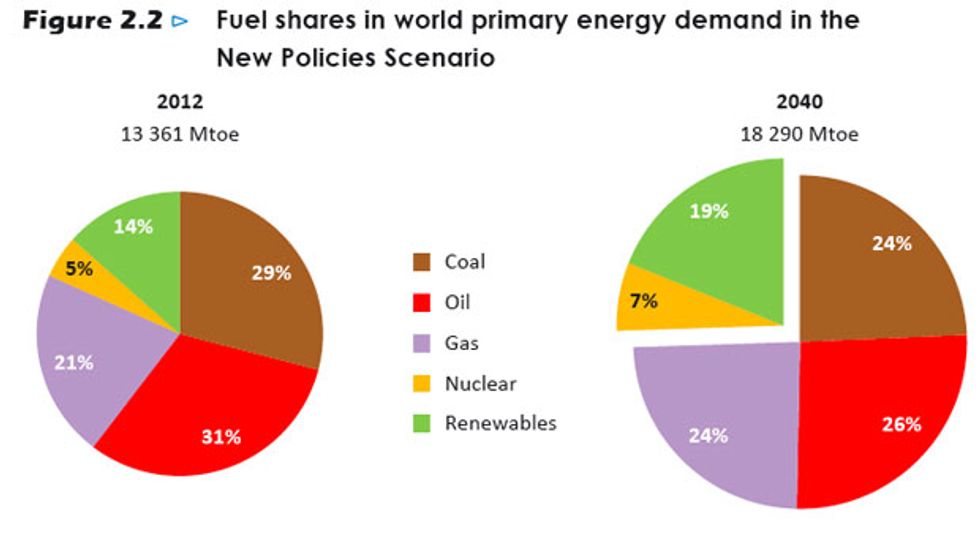By 2040, the world’s energy supply mix will be divided into nearly four equal parts; Oil, gas, coal and low-carbon sources—nuclear and renewables—according to the International Energy Agency’s (IEA) 2014 World Energy Outlook.
The assessment by the IEA finds that under current and planned policies, the average temperature will also increase by 3.6 degrees Celsius by 2100. Renewable energy takes a far greater role in new electricity supply in the near future—expanding from about 1700 gigawatts today to 4550 gigawatts in 2040—but it is not enough to offset the global dominance of fossil fuels.

“As our global energy system grows and transforms, signs of stress continue to emerge,” IEA Executive Director Maria van der Hoeven, said in a statement. “But renewables are expected to go from strength to strength, and it is incredible that we can now see a point where they become the world’s number one source of electricity generation.”
Renewable energy production will double as a share of world electricity demand by 2040, according to the report. But that still does not dethrone coal in electricity generation. Coal will simply shift regionally from the United States and China to Southeast Asia and India, according to the EIA.
The least sexy fuel of all, energy efficiency, is poised to be a winner in coming decades and could have an even greater impact if some of the world’s largest energy users carry through with proposed efficiency plans. Efficiency measures are set to halve the global growth in energy demand from 2 percent annually to about 1 percent beginning in 2025, according to the IEA.
Efficiency standards for cars and more stringent energy efficiency targets for industry and everyday devices are key to slowing the demand for energy, but they do not necessarily help diminish the world’ reliance on fossil fuels because the true price of fossil fuels are not acurately reflected in the price people pay in some regions.
Fossil fuels receive about $550 billion in subsidies in 2013, compared to $120 billion for all renewable energies. Although the fossil fuel subsidies were $25 billion lower than 2012, there is still vast room for improvement to end price breaks for the mature industries, especially in gas and oil-rich nations, which offer the bulk of the subsidies.
“Subsides to fossil fuels, which encourage wasteful consumption, remain a big problem, despite major efforts on the part of many countries around the world to reduce or eliminate them— primarily where they have become too much of a burden on the public purse,” the IEA states.
Despite the prevalence of fossil fuel subsidies, efficiency and renewables are gaining ground. The IEA’s 2014 World Energy Outlook was released at the same time that the U.S. and China pledged to reduce their carbon emissions by nearly a third by 2030. The targets are non-binding, but do provide a new benchmark for international negotiations. Such policies help to stall fossil fuel growth and reduce energy prices over all. Even in the Middle East, where energy is heavily subsidized in many countries, several countries have implemented stricter building codes for improve efficiency.
The reliance on oil, particularly in the transportation sector, remains fairly steady, according to IEA’s projections. Although there will be some movement toward gas-fueled vehicles, electric transportation, and energy efficiency improvements, the growth in oil for transport and in petrochemicals will largely mask those developments.
The picture painted by the IEA does not take into account technology breakthroughs that could change the picture significantly. Lower cost batteries for renewable-energy storage and advances in tidal power, among many other technologies, could greatly change the energy mix a quarter century from now.



